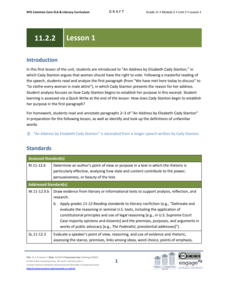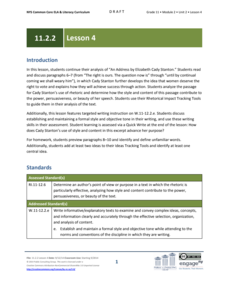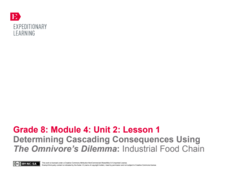EngageNY
Grade 11 ELA Module 1: Unit 2, Lesson 20
How does the setting impact other elements within a play? Using a helpful resource, scholars explore the question by completing a Quick Write after reading Act 5.1 of Shakespeare's Hamlet. Additionally, they engage in a whole-class...
EngageNY
Grade 11 ELA Module 1: Unit 2, Lesson 15
Scholars continue reading Act 3.1 from Shakespeare's Hamlet, discovering Ophelia's monologue about Hamlet. They complete a Quick Write to analyze Ophelia's perspective of Hamlet and participate in an optional jigsaw activity to explore...
EngageNY
Grade 11 ELA Module 1: Unit 2, Lesson 7
Following a ghost's advice may not be in anyone's best interest, but that doesn't stop Hamlet! Using an exciting resource, pupils continue reading Act 1 of Shakespeare's Hamlet, in which the ghost tries to convince Hamlet to seek revenge...
EngageNY
Grade 11 ELA Module 1: Unit 3, Lesson 4
How have society's expectations influenced female writers? Pupils explore the topic by reading chapter three of Virginia Woolf's A Room of One's Own. Scholars complete a Quick Write to analyze how Judith Shakespeare's experiences...
EngageNY
Grade 11 ELA Module 2: Unit 2, Lesson 1
How did Elizabeth Cady Stanton use rhetoric to convince others of her views? Scholars begin reading "An Address by Elizabeth Cady Stanton," which argues that women should have voting rights. Pupils complete a Quick Write to analyze how...
EngageNY
Grade 11 ELA Module 2: Unit 2, Lesson 2
How did Elizabeth Cady Stanton advocate for women's rights? Pupils consider this question as they continue reading "An Address by Elizabeth Cady Stanton." They complete a Quick Write, analyzing how satire and sarcasm advance the author's...
EngageNY
Grade 11 ELA Module 2: Unit 2, Lesson 4
How does style contribute to the power and persuasiveness of a speech? With the question in mind, scholars continue reading "An Address by Elizabeth Cady Stanton." They complete a Rhetorical Impact Tracking Tool to guide them in their...
EngageNY
Grade 11 ELA Module 2: Unit 2, Lesson 7
Joan of Arc, Mother Teresa, Rosa Parks ... many inspirational women have paved the way for future generations, and Elizabeth Cady Stanton is no exception. Scholars continue reading and analyzing "An Address by Elizabeth Cady Stanton."...
EngageNY
Analyzing the Significance of the Novel’s Title: Connecting the Universal Refugee Experience to Inside Out and Back Again, Part 2
How does poetry help people better understand societal issues? Pupils participate in a jigsaw activity to analyze poems from the novel Inside Out & Back Again. Next, they connect the poems to real-life refugee experiences from the...
EngageNY
Close Reading: Paragraph 4 of “Refugee and Immigrant Children: A Comparison”
Why is reading a text closely a helpful skill? Using the 13th of 20 lessons from the Grade 8 ELA Module 1, Unit 2 series, scholars continue reading the informational text "Refugee and Immigrant Children: A Comparison." They work with...
EngageNY
Finishing Who? Where? and Why? Research
Who? Where? Why? Scholars answer these questions to help identify the gist of Inside Out & Back Again. First, they add text evidence to their research folders. They then begin looking at a performance task in which they write their...
EngageNY
End of Unit 2 Assessment, Part 2: Revise Essay Drafts
Time to revise! Scholars revise their argument essays based on Shakespeare's A Midsummer Night's Dream using feedback from their teacher and peers. They begin their revisions after reviewing a mini-lesson on proper writing conventions.
EngageNY
Determining Cascading Consequences Using The Omnivore’s Dilemma: Industrial Food Chain
Which of Michael Pollan's four food chains from his book The Omnivore's Dilemma would best feed everyone in the United States? Using a thought-provoking resource, scholars learn how to create a Cascading Consequences chart to answer the...
EngageNY
Using Search Terms for Further Research: Industrial Organic Food Chain
Class members conduct independent research to continue examining the consequences of the industrial organic food chain from Michael Pollan's The Omnivore's Dilemma. Pupils learn about source credibility and effective search terms, then...
EngageNY
Practicing Structures for Reading: Gathering and Using Evidence to Analyze Salva’s and Nya’s Points of View (Chapter 4)
Class members discuss the gist of chapter four of A Long Walk to Water by Linda Sue Park with a partner and share their responses with the class. Next, they complete graphic organizers to answer text-dependent questions based on a close...
EngageNY
Mid-Unit Assessment: Gathering and Using Evidence to Analyze Points of View in A Long Walk to Water (Chapter 5)
Class members discuss how culture, place, and time influence a character's identity in A Long Walk to Water by Linda Sue Park. Then, as part of a mid-unit assessment, they complete a Gathering Evidence graphic organizer to answer the...

















